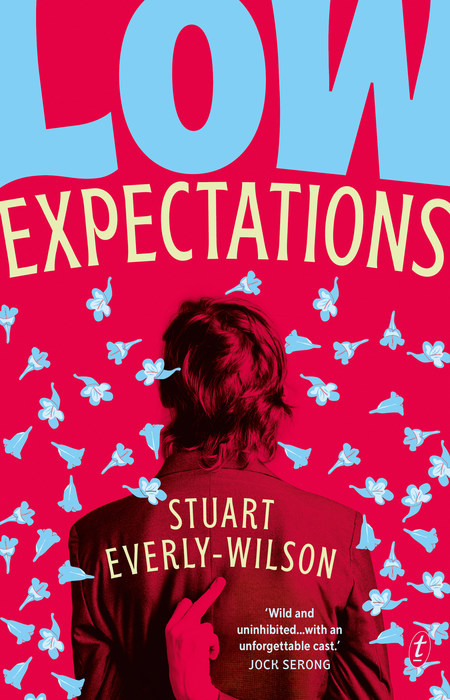Watch a Disney film or traipse into a bookstore or even just watch an ad or two and you’ll work out pretty quickly that we are supposed to be able to do anything.
All it takes is grit and gumption, a tenacious vision and some vibrant creativity and the world, or least the part that matters most to you, can be yours on a self-achievement platter.
It’s intoxicating as inspiring ideas but not always as achievable as the messaging makes it sound because life has a funny way of getting in the way and make something that looks gloriously straightforward seem like an impossible dream or a slog up a neverending mountain with no sign of a summit in sight.
That’s very much how it feels for Devon Destri, the 15-year-old protagonist at the heart of 1975-set Low Expectations, the stellar debut novel from Stuart Everly-Wilson, who is not stuck firmly on the wrong side of the tracks in the fictitious suburb of North Auburn – in the case of many suburbs in his part of Western Sydney that can feel as real as it is metaphorical – but who, thanks to his cerebral palsy and an overprotective mother harbouring a grave secret, has bene left to fly well below the radar, especially scholastically where the extremely bright young man is in the remedial section of the school, far from the “normals” as he terms them.
He isn’t wholly unhappy about this since staying in the remedial section with his friend Big Tammy and the other kids because it offers a type of safety from the bullying principally carried by Peter Novotny, the son of Hungarian immigrants whose father owns the corner store and who, like most of the neighbourhood hates Devon and his mother with a gossiping-obsessed passion.
“See, everyone in life has something going for them. Some little things of value that can be cashed in and turned into a portfolio: beauty, physical strength, famous parents, lots of money, no conscience, no integrity—any little thing. A gift that if used properly can reap great reward. My gift is that everyone thinks I’m stupid. I am far from stupid. But with my cerebral palsy it’s been the easier thing in the world to make people believe I am.” (P. 11)
The other thing that his place in a special part of John Smith High School offers him is a way to ensure no one really expects anything of him, which is fine because he doesn’t really expect much of himself.
It’s not that his mother treats him badly – she is loving and devoted though depressed and robotic in her approach to life until a possible new love comes along – but she is content to keep corralled away from expectations too for reasons that only begin to come clear when the big secret as the heart of this novel begins to unravel and makes its presence known to an oblivious Devon.
Rather annoyingly though for Devon, who typical teenager that he is hates everyone and everything save for Great Expectations by Charles Dicken, Big Tammy and his older neighbour Krenek who is the father figure he as always lacked, is that people keep seeing potential in him (he actually knows it’s there but refuses to give it much credence).
His teacher Mr. Flannery keeps gently pushing him, eventually anyway after a period of tired disinterest, to make something of himself and local hairdresser Carole, who takes Devon under her wing and gives him a new haircut to boot, believes he is capable of more than he lets on.
That sets up the prevailing theme of Low Expectations, an insightfully written novel that empathetically understands that we don’t always rise to the obvious occasion and that that can be for a myriad of reasons.
Take Devon as a prime example – he is actually very bright, thoughtful, insightful and caring when he admits those qualities to himself and even when he doesn’t, and yet, he goes to great lengths to convey an ambivalent sense of disengagement with life, often not choosing not to speak (he calls this, rather cleverly, being “hard of speaking”) or let on that he is an avid reader and talented writer and far more in sync with things that others think.
It’s a protective mechanism sure, but it’s also borne of someone who has always been told he’s a freak, by the bullies who wouldn’t known a vitally clever human being if they tripped over him, and chooses to both buy into it and use it for his own ends.
The joy of Low Expectations is watching Devon start to come slowly but surely alive as he begins to understand that maybe aiming for something in life and letting other people who like and love you support you getting there isn’t such a bad thing.
Wise, witty, annoying and flawed, a typical teenage boy really whom Everly-Wilson realises with vivacity and cheeky self-aware (and yet not) likeability in abundance, Devon’s journey from backwater life prospect to a real chance of making it is a pleasure to read because it feels so grounded and real.
“In the days that followed I avoided the Gulag whenever possible. I was tried of my fellow inmates—their annoying respect for me, the pleasure they took in seeking out my approval, my guidance, the opportunity to humiliate me at every turn. Instead, I spent my breaks up in normal school, under the branches of one of the fig trees. No one bothered me, and I came to learn by hanging out there that a lot of normal students had their own tortured shit going on.” (P. 163)
This is perhaps the genius of this wonderfully immersive novel.
It offers inspiration and hope but in a wholly Australian, unfussed kind of way, eschewing the American penchant for great epiphanies and lightbulb moments for the quiet one step forward, two steps back of a teenage boy who has long believed life has little to offer him and who has, rather self-protectively, spun a narrative that supports this clearly wrong, egregious story as a way of keeping him safe from – what exactly? Honestly there are many times when it’s clear not even Devon knows why.
The irony of his favourite book being Great Expectations is central part of Low Expectations‘s beguiling narrative and its willingness to dangle hope while remaining fully cognisant of the fact that happy-ever-afters, especially in the hard scrabble of poor Western Sydney suburbia, are thin to non-existent on the ground.
But even if Devon can’t see it, hope is there, and as Low Expectations makes it way merrily on and into your heart, it becomes more and more apparent to Devon, his mother, Krenek and a host of others that maybe calling time on life prematurely may not be the smartest thing to go.
Certainly there is more on offer than anyone really dares believe, especially Devon, and watching him finally see what could be rather than he thinks will be sends a thrill of quiet happiness down to the very depths of your soul (that is how much you will like and love the gorgeous flawed hidden brilliance of one Devon Destri).
Low Expectations is so appealing, not simply because it is written with sparkling language, good humour and rich, warm humanity, but because it offers up the idea that life is far richer in possibility than we give it credit for, soul-sapping reality notwithstanding, and that some cool things await if we’re just ready, like Devon, to sit up, take notice and grab them with both hands and a revelatory sense that maybe not everyone and everything is so “stupid” after all.

